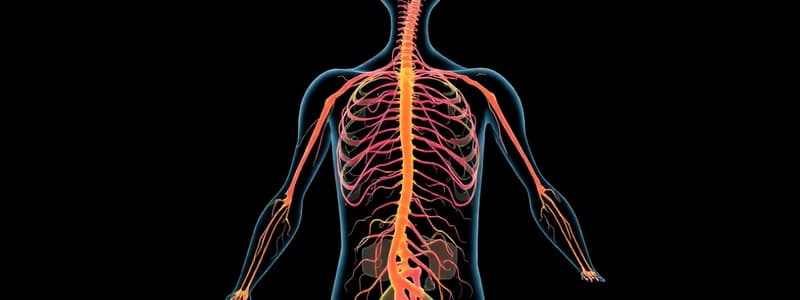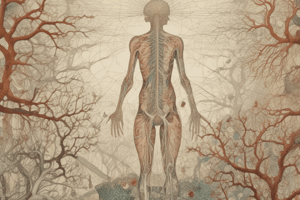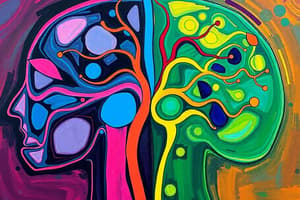Podcast
Questions and Answers
Which statement correctly describes the origin of the sympathetic nervous system?
Which statement correctly describes the origin of the sympathetic nervous system?
What primarily characterizes the parasympathetic nervous system?
What primarily characterizes the parasympathetic nervous system?
How does the sympathetic nervous system affect the heart?
How does the sympathetic nervous system affect the heart?
Which of the following is an effect of the sympathetic nervous system on the eyes?
Which of the following is an effect of the sympathetic nervous system on the eyes?
Signup and view all the answers
What effect does the parasympathetic nervous system have on salivary glands?
What effect does the parasympathetic nervous system have on salivary glands?
Signup and view all the answers
What is one effect of vasodilatation on the coronary arteries?
What is one effect of vasodilatation on the coronary arteries?
Signup and view all the answers
Which action is associated with bronchodilation in the lungs?
Which action is associated with bronchodilation in the lungs?
Signup and view all the answers
What effect does glycogenolysis in the liver produce?
What effect does glycogenolysis in the liver produce?
Signup and view all the answers
What is an action of the adrenaline secreted from the adrenal medulla?
What is an action of the adrenaline secreted from the adrenal medulla?
Signup and view all the answers
Which effect is related to the relaxation of the internal anal sphincter?
Which effect is related to the relaxation of the internal anal sphincter?
Signup and view all the answers
Flashcards
Sympathetic Nervous System
Sympathetic Nervous System
Part of autonomic nervous system, involved in "fight or flight" response.
Parasympathetic Nervous System
Parasympathetic Nervous System
Autonomic system active during rest, digestion, and relaxation.
Mydriasis
Mydriasis
Dilation of the pupil (eye opening).
Miosis
Miosis
Signup and view all the flashcards
Autonomic Nervous System
Autonomic Nervous System
Signup and view all the flashcards
Coronary Vasodilation
Coronary Vasodilation
Signup and view all the flashcards
Bronchodilation
Bronchodilation
Signup and view all the flashcards
GIT Gland Secretion/Vasodilation
GIT Gland Secretion/Vasodilation
Signup and view all the flashcards
Spleen Contraction
Spleen Contraction
Signup and view all the flashcards
Adrenal Medulla Hormone Release
Adrenal Medulla Hormone Release
Signup and view all the flashcards
Study Notes
Autonomic Nervous System
- The autonomic nervous system (ANS) is part of the peripheral nervous system.
- It regulates involuntary bodily functions.
- It is divided into two branches: sympathetic and parasympathetic.
Case Study 1
- Studies show some people fear speaking in public more than dying.
- A dry mouth can make speaking difficult for those who are afraid of public speaking.
- This can be explained by understanding the involuntary actions of the autonomic nervous system.
Case Study 2
- A 44-year-old woman working in her garden inhaled insecticide.
- The woman experienced symptoms like wheezing, constricted pupils, and slowed heart rate.
- The woman was treated with atropine sulfate.
Objectives of Case 2
- Insecticides contain organophosphates that inhibit acetylcholinesterase.
- Acetylcholinesterase is responsible for breaking down acetylcholine.
- The inhibition of acetylcholinesterase leads to excessive stimulation of autonomic receptors.
- The symptoms relate to the parasympathetic nervous system being overstimulated.
- Insecticides can affect the gastrointestinal system, potentially causing issues.
- Insecticides may cause generalized or localized sweating.
- Beta-adrenergic receptor antagonists can help counter the effects of insecticide poisoning.
Classification of Nervous System
- The nervous system is divided anatomically into the central nervous system (CNS) and the peripheral nervous system (PNS).
- The CNS consists of the brain and spinal cord.
- The PNS includes cranial nerves and spinal nerves, connecting the body to the CNS.
Physiological Division of Nervous System
- The peripheral nervous system (PNS) has sensory (afferent) and motor (efferent) divisions.
- The sensory division conducts impulses to the CNS.
- The motor division conducts impulses from the CNS to effectors.
- The motor division is further divided into autonomic and somatic divisions.
- The autonomic nervous system regulates involuntary functions (e.g., blood pressure, digestion).
- It is divided into the sympathetic and parasympathetic branches.
- The sympathetic division prepares the body for "fight or flight".
- The parasympathetic division is responsible for "rest and digest" functions.
- The somatic nervous system controls voluntary movements.
Autonomic Motor Neuron
- Autonomic motor neurons have pre- and postganglionic neurons.
- Most preganglionic neurons are myelinated.
- The preganglionic neuron synapses with the postganglionic neuron in a ganglion.
- Postganglionic neurons are typically unmyelinated.
Autonomic Nervous System - Additional Details
- Sympathetic activation causes increased heart rate, blood pressure, and respiratory rate.
- Parasympathetic activation slows heart rate, decreases blood pressure, and promotes digestion
- Specific actions of the sympathetic and parasympathetic divisions affect different organs and glands. (detailed breakdown in page 10).
- Chemical transmission occurs at synapses through neurotransmitters, like acetylcholine and norepinephrine.
Chemical Transmission
- Acetylcholine and norepinephrine are crucial neurotransmitters in the ANS.
- Acetylcholine is often the neurotransmitter in pre- and post-ganglionic parasympathetic pathways.
- Norepinephrine is the neurotransmitter in most post-ganglionic sympathetic pathways.
- Receptors for these neurotransmitters differ between sympathetic and parasympathetic branches impacting effects on organs.
- Methods for removing neurotransmitters from the synapse are necessary.
Studying That Suits You
Use AI to generate personalized quizzes and flashcards to suit your learning preferences.
Related Documents
Description
Explore the fascinating roles of the autonomic nervous system through two detailed case studies. Understand how it regulates involuntary functions and the implications in unique medical scenarios. This quiz will help you grasp the connection between psychological responses and physiological reactions.




